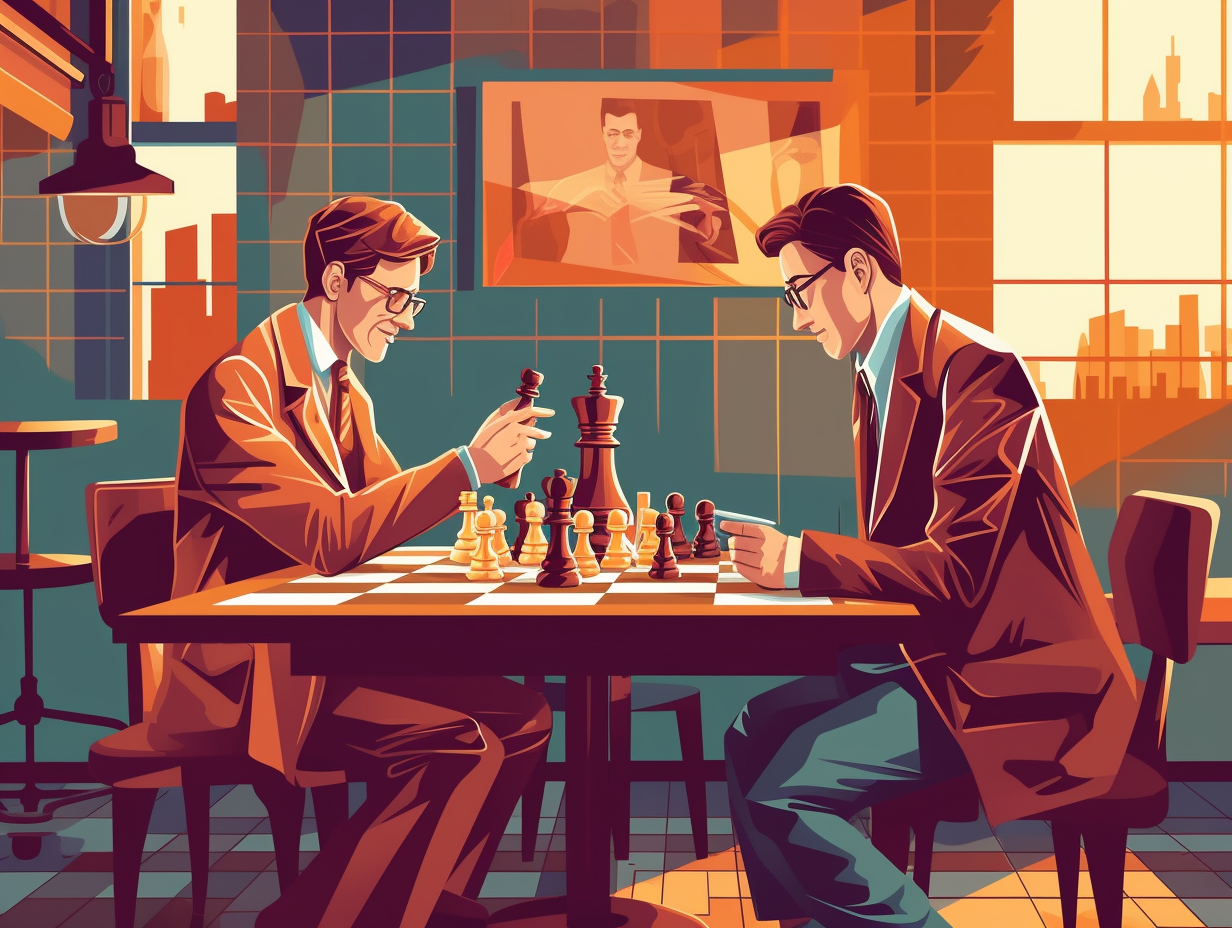Uncover the Joys of Gaming: Top 11 Fun Facts About Board Games You Never Knew!

1. Risk: The Inspiration of Strategy Games
Risk-ing it all in the name of world domination since 1957, this board game's undeniable charm has spawned more prodigies than a Mensa convention: Risk's simple yet invigorating gameplay became the inspiration for iconic strategy games such as Axis & Allies and Settlers of Catan, leading to an ever-expanding empire of editions, variants, and digital counterparts that continue to conquer hearts and minds across the globe.
Source => en.wikipedia.org
2. Monopoly Marathon Mysteries
For those who've always dreamed of attending a Monopoly-themed sleepover marathon that lasts longer than a cross-Atlantic flight, gather your money bags and grab your thimble: the longest game of Monopoly ever played remains a mystery, as Guinness World Records cannot verify the oft-circulated claim of a 70-day long game. What they do acknowledge are records for the most people playing at once (733) and the largest collection of Monopoly memorabilia.
Source => akidsco.com

Did you know the largest jigsaw puzzle in the world has a staggering 40,320 pieces? Discover more about this incredible feat from German game masters Ravensburger and other mind-blowing puzzle facts!
=> Fun Facts about Puzzles
3. Scrabble's Rise to Fame
Scrabble, the game that has made letter-lovers and word nerds giggle for generations, was once stuck in a proverbial state of L-I-M-B-O, waiting for its ticket to B-I-G T-I-M-E: The game's sales remained stagnant until Macy's department store placed an enormous order in 1952, catapulting Scrabble to fame and leading to the sale of over a million sets the following year, securing its title as the second best-selling game in U.S. history.
Source => lemelson.mit.edu
4. Candy Land: Polio Ward Escape
Before "30 minutes or it's free" pizza delivery and Netflix, polio-stricken children needed a sweet escape to stave off boredom: enter Candy Land, a board game invented in 1948 by former school teacher Eleanor Abbott. While in a San Diego hospital's polio ward, Abbott witnessed the ennui of immobilized young patients and cooked up a confectionery journey to offer distraction and movement fantasy. Milton Bradley brought the game to the public in 1949, without marketing it as a polio remedy but keeping a subtle nod with a boy in a leg brace depicted on the board.
Source => plansponsor.com

5. The Domino Effect: From Masks to Tiles
Whoever said "never judge a book by its cover" could've been talking about the tricky world of dominoes: people have been judging these rectangular beauties, making assumptions about their endless smorgasbord of pips, and trying to hide their fascination behind masks for centuries! However, the name "domino" likely came from the resemblance of the tiles to the Venetian Carnival costume consisting of a black-hooded robe and white mask. The earliest mention of dominoes goes all the way back to the Song dynasty China in the text "Former Events in Wulin" by Zhou Mi, and modern-dominoes first appeared in Italy during the 18th century. The Chinese domino sets boast of 32 pieces, with no blank faces unlike their European counterparts that have as many as 190 tiles with blank faces and contain all possible combinations of spot counts between zero and six.
Source => en.wikipedia.org
6. From Snakes and Ladders to Salvation
Before Snakes and Ladders was slithering its way into family game nights and causing disapproving side-eyes when players suddenly fell for the "snake's charm", it was once a religious and virtuous form of fun that sought to smite the sinners and elevate the saints: Originally an ancient Indian board game designed to teach children about moral virtues and vices, it featured ladders as a metaphor for virtues, such as generosity and faith, while snakes represented vices like lust and anger, with players navigating the board filled with symbolic images of gods, angels, animals, flowers, and people. This moral dimension was shed of its divine skin when it was brought to England in the 19th century by colonial rulers, transforming it into the race of luck and childhood excitement we know today.
Source => swatid1993.wordpress.com
7. Milton Bradley's Virtuous Game of Life
Before chasing paper and shooting up the corporate ladder became all the rage: the original Game of Life was actually more of a wholesome, moral-ometer! Milton Bradley, the inventor, preferred to reward players for virtues like honesty and perseverance, using points on squares instead of cold, hard cash. While the early version of the game did feature some darker consequences for players who strayed off the righteous path, thankfully, there was no "game over" square calling it quits with a side of suicide.
Source => vox.com
8. Monopoly's Tax-Evading Origins
In a plot twist that would make George R.R. Martin proud, Monopoly is not quite the game of thrones it claims to be: The original patent was granted to Elizabeth Magie in 1904 for her game called The Landlord's Game, which evolved through various contributions, and the commonly believed sole creator, Charles Darrow, was debunked in a 1970s legal tussle, revealing Monopoly's true, tax-evading ancestry.
Source => en.wikipedia.org
9. Gloomhaven's Monster-Slaying Sensation
Once upon a gloomy Kickstarter, nearly 5,000 brave souls rallied together, pooling their gold coins to bring their monster-slaying dreams to life: Isaac Childres’ Gloomhaven was triumphantly funded with over $386,000 and evolved into a jaw-dropping sensation with the announcement of Gloomhaven: Jaws of the Lion, set to pounce onto the mass-market scene in Q3 2020.
Source => kicktraq.com

10. Reversi vs. Othello: A Victorian Game Duel
In a time when Queen Victoria reigned supreme and Sherlock Holmes cracked dastardly cases, two Englishmen fought a fierce duel of wits – truly, a battle for the ages: Reversi, now widely known as Othello, was invented by Lewis Waterman and John W. Mollett in 1883, with both men vying for the honor of being its creator. The game captured the attention of English society, and its first recorded mention appeared in The Saturday Review in August 1886. Since then, this captivating contest of tactical triumph has sold over 40 million classic games across more than 100 countries, securely planting Reversi/Othello in the hallowed halls of board game legends.
Source => en.wikipedia.org
11. Clue(do): A Whodunit Born from Ludo
Instead of Colonel Mustard with a candlestick, we could be accusing Miss Scarlet with a cheeky game of Ludo: Believe it or not, Cluedo was actually created by British inventor Anthony E. Pratt in 1943 as a witty play on "clue" and the popular board game "Ludo", and was first manufactured by Waddingtons in the United Kingdom in 1949 under that very name, while in America, it became known as Clue.
Source => en.wikipedia.org




